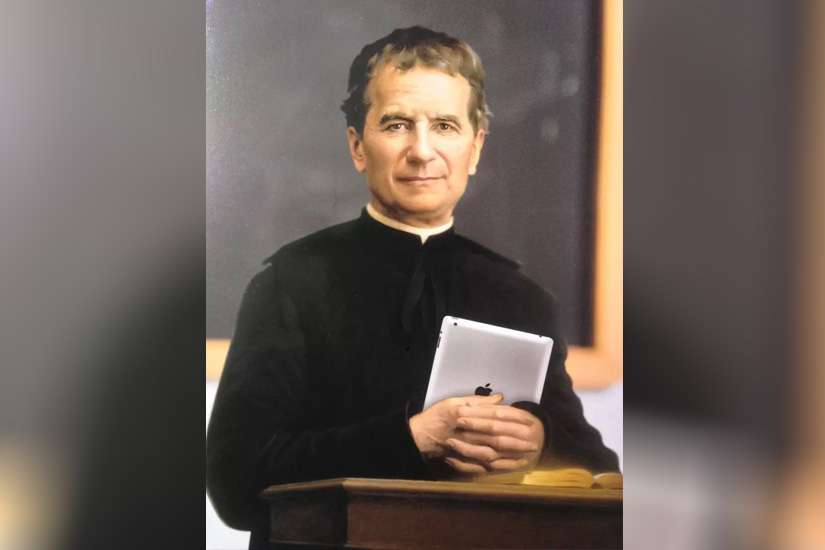It was in the 1980s that the Salesians, an order of religious brothers and priests founded by the saint, took charge of St. Benedict’s parish, establishing a foothold that will be a base for some of this year’s celebrations to honour the bi-centennial of St. John Bosco’s birth.
John Bosco is the patron saint of young people, apprentices and Catholic publishers and editors. What is most misunderstood about him is “the depth of his mysticism,” said Salesian Father Michael Pace, pastor of St. Benedict’s.
“People associate him as the priest of the playground, and indeed he was. But that was the external manifestation, the entry level of a profoundly mystical relationship with God,” he said. “It was a mysticism that allowed him to be at the same time in constant dialogue with God and constantly grounded in practical ways of helping the most marginalized find new hope, new involvement and new ways of participating in every level of society.”
Pace grew up in St. Benedict’s parish.
“When the Salesians came, I had a sense of ‘Oh, with these men I feel at home.’ Their style of combining youth ministry with pastoral animation of the parish, their family spirit, the way they reached out to me as a young person, I just felt at home,” he said.
That style stems back to their founder, who began his mission in the early 19th century in the hills of Becchi, at the foot of the Italian Alps. John Bosco was born Aug. 16, 1815 to Margaret and Francis Bosco. Francis died two years later, leaving his wife to raise three sons and care for the homestead. Known as Mama Margaret, she taught John, his older brother Joseph and their stepbrother Anthony that work was a privilege made easier when one held a sense of joy.
As the story goes, when he was little, Bosco took offence to a priest who ignored him, thereafter vowing to grow up to become a priest who would speak to children and treat them very well.
Growing up, he was known as a leader and friend to his fellow farm lads. And on the field in front of his mother’s house, he opened his own carnival show, attracting locals with magic tricks. He charged one rosary to be recited by each attendee and the ringmaster would deliver the Sunday sermon.
At the age of nine, Bosco received what he interpreted to be a clear call from God in the form of a dream, a call to the priesthood. By 1835, at the age of 20, Bosco was ready for the seminary.
He was ordained in Turin on June 5, 1841. Now known as Don Bosco (Fr. Bosco), he soon struck up friendships with the boys from the streets. He created The Oratory, a club for boys, that met each Sunday for Mass and confessions. There was an hour of religious instruction before he took them out to the country for games. He later founded a permanent home for his Oratory and called it The Oratory of St. Francis de Sales.
Bringing Mama Margaret to work with him, Don Bosco eventually built an orphanage and his own trade school. Priests from all over Italy would flock to work with Bosco and follow his Preventive System, based on Christian charity and the genuine building of relationships between teacher and pupil to keep children on the right life path. This lives on with the Salesians to this day.
“If you’re a teacher just in the classroom, but you’re not out there in the playground, you may be a good teacher, but you’ll never be a brother,” said Pace. “You need to become a friend of the young people. So in the parish, we do all of our priestly services and duties, but we are very intentional about creating moments and spaces where people can come and we can be with them for fun moments, for informal moments. Not just a nine-to-five spirituality, (but) a spirituality of availability.”
In 1859, with his first members being boys who grew up with him guiding them, Don Bosco founded the Congregation of St. Francis de Sales. In 1875, with Mary Mazarello, he founded the Daughters of Mary Help of Christians, popularly known as the Salesian Sisters. Today, the Salesians are in more than 130 countries. In Canada, they are in British Columbia, Quebec and Hamilton, Ont., in addition to Toronto.
Today, the Salesian mission encompasses not only youth but the faithful from all stages of life.
St. John Bosco’s legacy has been “empowering the young to know how precious they are to God and they are able to be bearers of Christ to a world in need,” said Pace.
“We’re celebrating his 200th birthday. And the point of that is the saints are not just relics from the past... They continue to walk the journey of faith with us to inspire and guide. And so the spirituality of Don Bosco, as it would be for any saint, is the way their spirit remains alive, not just in the Salesians, but also in the many people who derive inspiration and strength and courage and hope from the saint’s way of bringing us to Jesus, because ultimately it’s always about Jesus.”
In Toronto, the celebration of St. John Bosco’s birth begins Jan. 31 with a 10 a.m. Mass with Cardinal Thomas Collins and a light lunch at St. Paul’s Basilica. For more information on this and other anniversary event, visit stbenedicts.ca.


